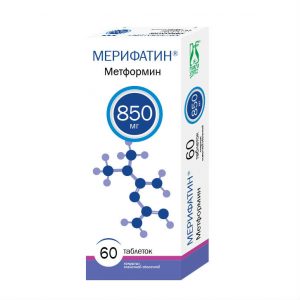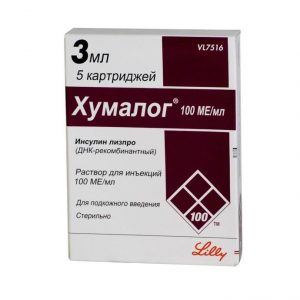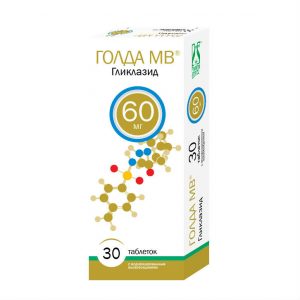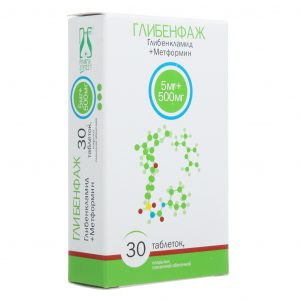Description
Latin name
MANINIL ®
Release form
Tablets.
Packing
120 pcs
Pharmacological action
Pharmacodynamics
Oral hypoglycemic drug from the group of II generation sulfonylurea derivatives.
Stimulates insulin secretion by binding to specific membrane receptors of the pancreatic cell, reduces the threshold for glucose pancreas , increases the sensitivity to insulin and its binding to target cells, increases the release of insulin, enhances the effect of insulin on glucose uptake muscle and liver thereby reducing the concentration of glucose in the blood. Acts in the second stage of insulin secretion. It inhibits lipolysis in adipose tissue. It has a hypolipidemic effect, reduces the thrombogenic properties of blood.
Maninil ® 1.5 and Maninil ® 3.5 in micronized form is a high-tech, especially ground form of glibenclamide, which allows the drug to be absorbed from the digestive tract faster. In connection with the earlier achievement of Cmax of glibenclamide in plasma, the hypoglycemic effect almost corresponds to the time increase in the concentration of glucose in the blood after eating, which makes the effect of the drug softer and physiological. The duration of the hypoglycemic effect is 20-24 hours.
The hypoglycemic effect of the drug Maninil ® 5 develops after 2 hours and lasts 12 hours.
Pharmacokinetics
Absorption
After oral administration of Maninil 1.75 and Maninil 3.5 there is a rapid and almost complete absorption from the gastrointestinal tract. Full release of the microionized active substance occurs within 5 minutes.
After ingestion of Maninil 5, absorption from the gastrointestinal tract is 48-84%. Tmax – 1-2 hours. Absolute bioavailability – 49-59%.
Distribution of
Plasma protein binding is more than 98% for Maninil 1.75 and Maninil 3.5, 95% for Maninil 5.
Metabolism and excretion
Almost completely metabolized in the liver to form two inactive metabolites, one of which is excreted by the kidneys and the other with bile.
T1 / 2 for Maninil 1.75 and Maninil 3.5 is 1.5-3.5 hours, for Maninil 5 – 3-16 hours.
Indications
Type 2 diabetes mellitus – as monotherapy or as part of combination therapy with other oral hypoglycemic drugs, except for sulfonylureas and clayides.
Contraindications
Hypersensitivity to glibenclamide and / or components of the
preparation hypersensitivity to other sulfonylureas, sulfonamides, diuretics (diuretics) containing a sulfonamide group in the molecule and probenecid, since cross reactions may occur
type 1 diabetes severe (CC less than 30 ml / min)
decompensation of carbohydrate metabolism in infectious diseases, burns, injuries or after major surgery when insulin is indicated inoculation
leukopenia
intestinal obstruction, gastric paresis
hereditary lactose intolerance, lactase deficiency or glucose and lactose malabsorption syndrome
glucose-6-phosphate dehydrogenase deficiency
pregnancy and lactation (breastfeeding)
children and adolescents under 18 years of age (efficacy and safety have not been studied).
With caution, the drug should be prescribed: for diseases of the thyroid gland (with impaired function), febrile syndrome, hypofunction of the anterior pituitary or adrenal cortex, chronic alcoholism, acute alcohol intoxication, in elderly patients (over 70 years old) due to the risk of hypoglycemia .
Use during pregnancy and lactation
The drug is contraindicated for use during pregnancy and during breastfeeding.
When pregnancy occurs, the drug should be discontinued.
Composition
1 tablet contains:
Active substances:
glibenclamide 1.75 mg.
Excipients:
lactose monohydrate – 68.99967 mg,
potato starch – 26 mg,
hemetellose – 11 mg,
silicon dioxide colloid – 2 mg,
magnesium stearate – 0.25 mg,
dye (E124) – 0.00033 mg.
Dosage and administration
The dose depends on the age, severity of diabetes mellitus, fasting blood glucose concentration and 2 hours after a meal.
The initial dose of Maninil 1.75 is 1-2 tablets (1.75-3.5 mg) 1 time / day. With insufficient effectiveness, under the supervision of a doctor, the dose of the drug is gradually increased until the daily dose necessary to stabilize carbohydrate metabolism is reached. Increasing the dose should be done at intervals from several days to 1 week, until the required therapeutic dose is reached, which should not exceed the maximum. The maximum daily dose of Maninil 1.75 is 6 tablets (10.5 mg).
If the daily dose of glibenclamide exceeds 3 tablets of the drug Maninil ® 1.75, it is recommended to use the drug Maninil 3.5.
Switching from other hypoglycemic drugs to Maninil 1.75 should be started under medical supervision with 1-2 tablets of Maninil 1.75 per day (1.75-3.5 mg), gradually increasing the dose to the necessary therapeutic level.
The initial dose of Maninil ® 3.5 is 1 / 2-1 tablets (1.75-3 mg) 1 time / day. With insufficient effectiveness under the supervision of a doctor, the dose of the drug is gradually increased until the daily dose is reached, necessary to stabilize carbohydrate metabolism. Increasing the dose should be done at intervals from several days to 1 week, until the required therapeutic dose is reached, which should not exceed the maximum. The maximum daily dose of Maninil ® 3.5 is 3 tablets (10.5 mg).
Switching from other hypoglycemic drugs to Maninil ® 3.5 should begin under medical supervision with 1 / 2-1 tablets of Maninil ® 3.5 per day (1.75-3.5 mg), gradually increasing the dose to the necessary therapeutic level.
The initial dose of Maninil ® 5 is 1 / 2-1 tablets (2.5-5 mg) 1 time / day. With insufficient effectiveness, under the supervision of a doctor, the dose of the drug is gradually increased until the daily dose necessary to stabilize carbohydrate metabolism is reached. Increasing the dose should be done at intervals from several days to 1 week, until the required therapeutic dose is reached, which should not exceed the maximum. The maximum daily dose of Maninil ® 5 is 3 tablets (15 mg).
Switching from other hypoglycemic drugs to Maninil ® 5 should begin under the supervision of a doctor with 1 / 2-1 tablets of Maninil ® 5 per day (2.5-5 mg), gradually increasing the dose to the necessary therapeutic level.
In elderly patients, debilitated patients, patients with reduced nutrition, in patients with severe impaired renal or hepatic function, the initial and maintenance dose of Maninil ® should be reduced due to the risk of hypoglycemia.
Maninil ® should be taken before meals, without chewing and drinking a small amount of liquid. Daily doses of up to 2 tablets should usually be taken 1 time / day – in the morning, immediately before breakfast. Higher doses are divided into morning and evening doses.
If you skip one dose of the drug, the next tablet should be taken at the usual time, while it is not allowed to take a higher dose.
Side effects
Determination of the frequency of side effects:
often (> 1/100, <1/10) infrequently (> 1/1000, <1/100) rarely (> 1/10 000, < 1/1000) is very rare (<1/10 000), including single messages. From the side of metabolism: often – hypoglycemia (hunger, hyperthermia, tachycardia, drowsiness, weakness, moisture in the skin, impaired coordination of movements, tremor, general anxiety, a sense of fear, headache, transient neurological disorders, including disorders vision and speech, the appearance of paresis or paralysis or altered perceptions of sensations) increase in body weight. From the digestive system: infrequently – nausea, a feeling of heaviness in the stomach, belching, vomiting, abdominal pain, diarrhea, metallic taste in the mouth. From the liver and biliary tract: very rarely – a temporary increase in the activity of liver enzymes, intrahepatic cholestasis, hepatitis. From the side of the immune system: infrequently – itching, urticaria, purpura, petechiae, increased photosensitivity is very rare – generalized allergic reactions, accompanied by skin rash, arthralgia, fever, proteinuria and jaundice, allergic vasculitis, anaphylactic shock. From the hemopoietic system: rarely – thrombocytopenia is very rare: leukopenia, erythropenia, agranulocytosis in isolated cases – pancytopenia, hemolytic anemia. Other: very rare – impaired vision and accommodation disorders, increased diuresis, transient proteinuria, hyponatremia, disulfiram-like reaction when taking alcohol (the most common signs of the effect: nausea, vomiting, abdominal pain, sensation of heat of the face and upper body, tachycardia, dizziness, headache), cross allergy to probenecid, sulfonylureas, sulfonamides, diuretics (diuretics) containing a sulfonamide group in the molecule. Overdose Symptoms: hypoglycemia (feeling of hunger, hyperthermia, tachycardia, drowsiness, weakness, skin moisture, impaired movement coordination, tremor, general anxiety, anxiety, headache, transient neurological disorders (such as visual and speech disorders, paresis or paralysis, or altered sensations). With the progression of hypoglycemia, patients may lose self-control and consciousness, develop hypoglycemic coma. Treatment: With mild hypoglycemia, the patient should take a piece of sugar, food or drinks with a high sugar content (jam, honey, a glass of sweet tea). In case of unconsciousness it is necessary to enter in / in glucose – 40-80 ml of 40% solution of dextrose (glucose), then infusion of 5-10% solution of dextrose. You can then additionally inject 1 mg of glucagon in / in, in / m or p / k. If the patient does not regain consciousness, this measure can be repeated further, intensive care may be required. Storage conditions Store in a dark place at a temperature not exceeding 25 ° C. The Expiration of is 3 years. Deystvuyuschee substances Hlybenklamyd pdf7 ap1765 from pharmacies Prescription dosage form dosage form tablets




